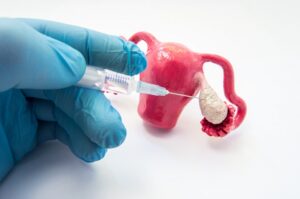Embarking on the journey to parenthood can be a challenging yet rewarding experience, especially for individuals with Polycystic Ovary Syndrome (PCOS). PCOS, a common hormonal disorder affecting reproductive-age individuals, often presents obstacles to regular ovulation, making conception more elusive. However, there is hope on the horizon in the form of Letrozole, a medication gaining popularity for its effectiveness in ovulation induction. In this blog, we will explore Letrozole ovulation induction PCOS, its role in managing PCOS-related fertility issues, and the empowering journey it offers to those aspiring to build their families.
Contents
Is Ovulation Induction Good For PCOS?
 Ovulation induction, particularly using medications like Letrozole, has shown promising results in addressing fertility issues associated with Polycystic Ovary Syndrome (PCOS). PCOS often disrupts the normal ovulatory process, leading to irregular or absent menstrual cycles, and consequently, difficulties in conceiving. Ovulation induction medications work by regulating the hormonal imbalances that characterize PCOS, promoting the development and release of mature eggs from the ovaries.
Ovulation induction, particularly using medications like Letrozole, has shown promising results in addressing fertility issues associated with Polycystic Ovary Syndrome (PCOS). PCOS often disrupts the normal ovulatory process, leading to irregular or absent menstrual cycles, and consequently, difficulties in conceiving. Ovulation induction medications work by regulating the hormonal imbalances that characterize PCOS, promoting the development and release of mature eggs from the ovaries.
Letrozole, in particular, has gained popularity for its efficacy in inducing ovulation while minimizing the risk of multiple pregnancies associated with other fertility medications. By encouraging regular ovulation, these interventions enhance the chances of conception for individuals with PCOS. However, the appropriateness of Letrozole ovulation induction PCOS should be determined through consultation with a healthcare provider, as each case is unique.
Why Is Letrozole Ovulation Induction Better For PCOS?
Letrozole is often considered a favorable option for ovulation induction in individuals with Polycystic Ovary Syndrome (PCOS) due to several factors that make it advantageous for this specific population.
- Improved Ovulation Rates
Letrozole has demonstrated higher ovulation rates than other medications commonly used for ovulation induction, such as Clomiphene. It effectively promotes the development and release of mature eggs, addressing one of the primary challenges in PCOS where irregular or absent ovulation can hinder conception.
- Reduced Risk of Multiple Pregnancies
Unlike some other fertility medications, Letrozole has shown a lower risk of multiple pregnancies. This is a crucial consideration, especially for individuals with PCOS who may already face higher chances of multiple pregnancies. The ability to induce ovulation with a lower risk of multiple gestations makes Letrozole a safer choice for many patients.
- Limited Impact on Cervical Mucus
Letrozole minimally impacts cervical mucus, which is important for sperm transport, unlike Clomiphene. This can sometimes lead to changes in cervical mucus that may impede sperm movement, Letrozole’s influence is less pronounced, maintaining a more favorable environment for sperm.
- Improved Pregnancy Rates
Studies have suggested that Letrozole may be associated with higher pregnancy rates compared to Clomiphene in women with PCOS. The increased likelihood of achieving a successful pregnancy further contributes to the preference for Letrozole in the management of PCOS-related infertility.
It’s important to note that the choice of medication for ovulation induction is highly individualized. Therefore, what works best can vary from person to person. Consulting with a healthcare provider is crucial to determine the most suitable treatment plan.
How Does It Work?
 Letrozole, an aromatase inhibitor, works by influencing the hormonal milieu in the body, particularly the levels of estrogen. In individuals with PCOS, hormonal imbalances disrupt the normal menstrual cycle and ovulation. Letrozole’s mechanism of action addresses these imbalances, primarily by inhibiting the activity of the aromatase enzyme.
Letrozole, an aromatase inhibitor, works by influencing the hormonal milieu in the body, particularly the levels of estrogen. In individuals with PCOS, hormonal imbalances disrupt the normal menstrual cycle and ovulation. Letrozole’s mechanism of action addresses these imbalances, primarily by inhibiting the activity of the aromatase enzyme.
Suppression of Estrogen Production
Aromatase is an enzyme responsible for converting androgens (male hormones) into estrogens (female hormones), predominantly in the ovaries. Letrozole inhibits aromatase, leading to a reduction in estrogen production. Lower estrogen levels trigger the release of gonadotropins, specifically follicle-stimulating hormone (FSH), from the pituitary gland.
Increased FSH Levels
The rise in FSH levels stimulates the ovaries to develop and mature follicles. In the context of PCOS, where anovulation (lack of ovulation) is common, Letrozole’s ability to enhance FSH-driven follicular development is crucial. This process encourages the growth of ovarian follicles, each containing an egg.
Promotion of Ovulation
As the ovarian follicles mature, one dominant follicle is often selected for ovulation. Letrozole aids in this process, promoting the release of a mature egg from the ovary. This is a pivotal step in fertility treatment, as successful ovulation is essential for conception.
Normalization of Menstrual Cycle
By inducing regular ovulation, Letrozole helps restore a more predictable and regular menstrual cycle. This is significant for individuals with PCOS, as irregular or absent menstruation is a common symptom of the condition.
It’s important to note that Letrozole is typically administered in specific dosage regimens under the supervision of a healthcare provider. Monitoring the response to the medication through ultrasound and hormonal assessments allows for adjustments to the treatment plan as needed. The goal is to achieve a balance that facilitates ovulation while minimizing the risks associated with fertility treatments.
How Much Letrozole Should I Take For PCOS?
The appropriate dosage of Letrozole for Polycystic Ovary Syndrome (PCOS) varies from individual to individual, and it is determined by your healthcare provider based on factors such as your specific medical history, response to the medication, and other individual characteristics. Typically, Letrozole is prescribed in a cycle, and the dosage commonly ranges from 2.5 to 7.5 milligrams per day.
The standard starting dose is often 2.5 mg per day, and your healthcare provider may adjust the dosage in subsequent cycles depending on your ovarian response and the achievement of ovulation. The goal is to find the lowest effective dose that induces ovulation while minimizing the risk of side effects.
It’s crucial to follow your healthcare provider’s recommendations and not self-prescribe or adjust the dosage without their guidance. Regular monitoring through ultrasounds and hormonal assessments is often conducted during the treatment cycle to assess your body’s response to Letrozole. This allows for any necessary adjustments to optimize the chances of successful ovulation and conception.
Always consult with your healthcare provider before starting or making changes to any medication regimen, as they will consider your specific health conditions and tailor the treatment plan accordingly.
What Are The Challenges Of Letrozole Ovulation Induction PCOS?
 While Letrozole is generally considered effective for ovulation induction in individuals with Polycystic Ovary Syndrome (PCOS), there are some challenges and considerations associated with its use:
While Letrozole is generally considered effective for ovulation induction in individuals with Polycystic Ovary Syndrome (PCOS), there are some challenges and considerations associated with its use:
Variable Response
Individuals with PCOS can exhibit a variable response to Letrozole. The optimal dosage may vary among patients, and some individuals may require adjustments to find the right balance between inducing ovulation and minimizing side effects.
Risk of Multiple Pregnancies
While the risk of multiple pregnancies with Letrozole is lower than some other fertility medications, it still exists. Multiple pregnancies, such as twins or triplets, can carry higher risks for both the mother and the babies, requiring careful monitoring and management.
Side Effects
Letrozole, like any medication, may have side effects. Common side effects include hot flashes, fatigue, headaches, and dizziness. It’s essential to communicate any side effects to your healthcare provider, who can adjust the dosage or provide supportive care as needed.
Thin Endometrial Lining
In some cases, Letrozole may lead to a thinner endometrial lining, which could affect implantation. An adequate endometrial lining is crucial for the successful implantation of the embryo. Your healthcare provider will monitor the thickness of the endometrial lining during the treatment cycle.
Ovarian Hyperstimulation Syndrome (OHSS)
While the risk is lower compared to some other medications, there is still a potential for Ovarian Hyperstimulation Syndrome, a condition where the ovaries become enlarged and fluid accumulates in the abdominal cavity. Severe cases of OHSS are rare but can be a concern.
Emotional and Psychological Impact
The emotional toll of fertility treatments, including Letrozole ovulation induction, should not be underestimated. The process can be emotionally challenging, and individuals may experience stress, anxiety, or depression. Support from healthcare providers, counselors, and support groups can be beneficial.
It’s important to approach Letrozole ovulation induction PCOS under the guidance of a qualified healthcare provider who can monitor your progress, make necessary adjustments, and provide support throughout the fertility journey. While there are challenges, many individuals with PCOS have successfully conceived with the help of Letrozole, and the benefits often outweigh the potential drawbacks when managed carefully.
Conclusion
In conclusion, Letrozole emerges as a promising ally for individuals navigating the challenges of Polycystic Ovary Syndrome (PCOS) on their journey to parenthood. This medication, designed to stimulate ovulation, offers hope by addressing the hormonal imbalances that often hinder conception in individuals with PCOS. Its favorable features, including a reduced risk of multiple pregnancies and improved ovulation rates, make Letrozole a preferred choice.
With the guidance of healthcare providers, personalized treatment plans, and a supportive mindset, individuals can navigate these challenges. The journey may be complex, but with Letrozole, there lies a beacon of hope and possibilities for those facing PCOS-related infertility. If you are facing PCOS-related issues, PCOS treatment at HerMantra can help. Book your free trial online pcos treatment session now.


